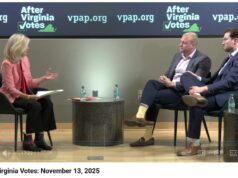 Today’s Supreme Court decision on racial gerrymandering invalidates an Alabama redistricting plan that packed minority voters into majority-minority districts. What “packing” African Americans does is to basically guarantee an African-American will be elected in the “packed” district(s), but that African Americans’ voting power will be diluted everywhere else.
Today’s Supreme Court decision on racial gerrymandering invalidates an Alabama redistricting plan that packed minority voters into majority-minority districts. What “packing” African Americans does is to basically guarantee an African-American will be elected in the “packed” district(s), but that African Americans’ voting power will be diluted everywhere else.
Here in Virginia, this issue came to a head last fall, when three federal judges ruled “that the lines of the state’s 3rd Congressional District were drawn in violation of the U.S. Constitution” and “ordered the General Assembly to redraw them by April 1, in time for the next congressional election in 2016.”
The 3rd District is the only one of Virginia’s 11 congressional districts with an African American majority. It has been represented since 1992 by Rep. Bobby Scott, a Newport News Democrat who is unopposed in the Nov. 4 election.
In a 2-1 decision, the judges agreed with the plaintiffs in a lawsuit filed a year ago that the congressional redistricting plan adopted by the Republican-controlled Assembly in 2012 amounted to racial gerrymandering, packing African American voters into Scott’s district and leaving adjoining districts safer for their Republican incumbents.
In order to comply with the panel’s ruling, the legislature might have to pull some Democratic-leaning voters out of Scott’s district and redistribute them to surrounding districts, possibly creating less-hospitable electoral terrain for Republican Reps. Randy Forbes of Chesapeake and Scott Rigell of Virginia Beach.
Note that in 2012, Barack Obama lost the 4th CD (Forbes’ district) by just 1 point, while Tim Kaine narrowly won it. Thus, a shift of even a few points could make Randy Forbes’ political life a lot less cozy. Same thing with Scott Rigell, whose second district Barack Obama narrowly won in 2012.
Meanwhile, yet another Virginia lawsuit accuses “the General Assembly of ‘racial gerrymandering’ by packing black voters into 12 of the state’s House of Delegates districts.” For that reason, “[t]he plaintiffs are asking the court to declare the challenged districts invalid and to block the state from holding elections because of the disputed districts.” If plaintiffs win this case, it could lead to the redrawing not just of the affected districts, but also potentially surrounding ones as well. And that, in turn, could have significant consequences for the balance of power in the Virginia House of Delegates. Not surprisingly, House of Delegates Republicans are in no hurry to deal with this situation, and would clearly prefer that it just go away. Unfortunately for them, but fortunately for those who dislike racial gerrymandering and “packing,” that’s not likely.
Bottom line: Today’s SCOTUS ruling has potentially big implications for Virginia, because Rep. Bobby Scott’s case is factually similar, as is the House of Delegates case.












![[UPDATED with Jim Ryan’s Letter] In Response to Youngkin’s “Sad, Whiny” Letter to Spanberger About UVA, VA Senate Majority Leader Surovell Says He’s “truly embarrassed for Gov Youngkin…After 4 yrs he has no understanding of basic VA govt structure”](https://bluevirginia.us/wp-content/uploads/2025/11/youngkinspanuva3-100x75.jpg)
